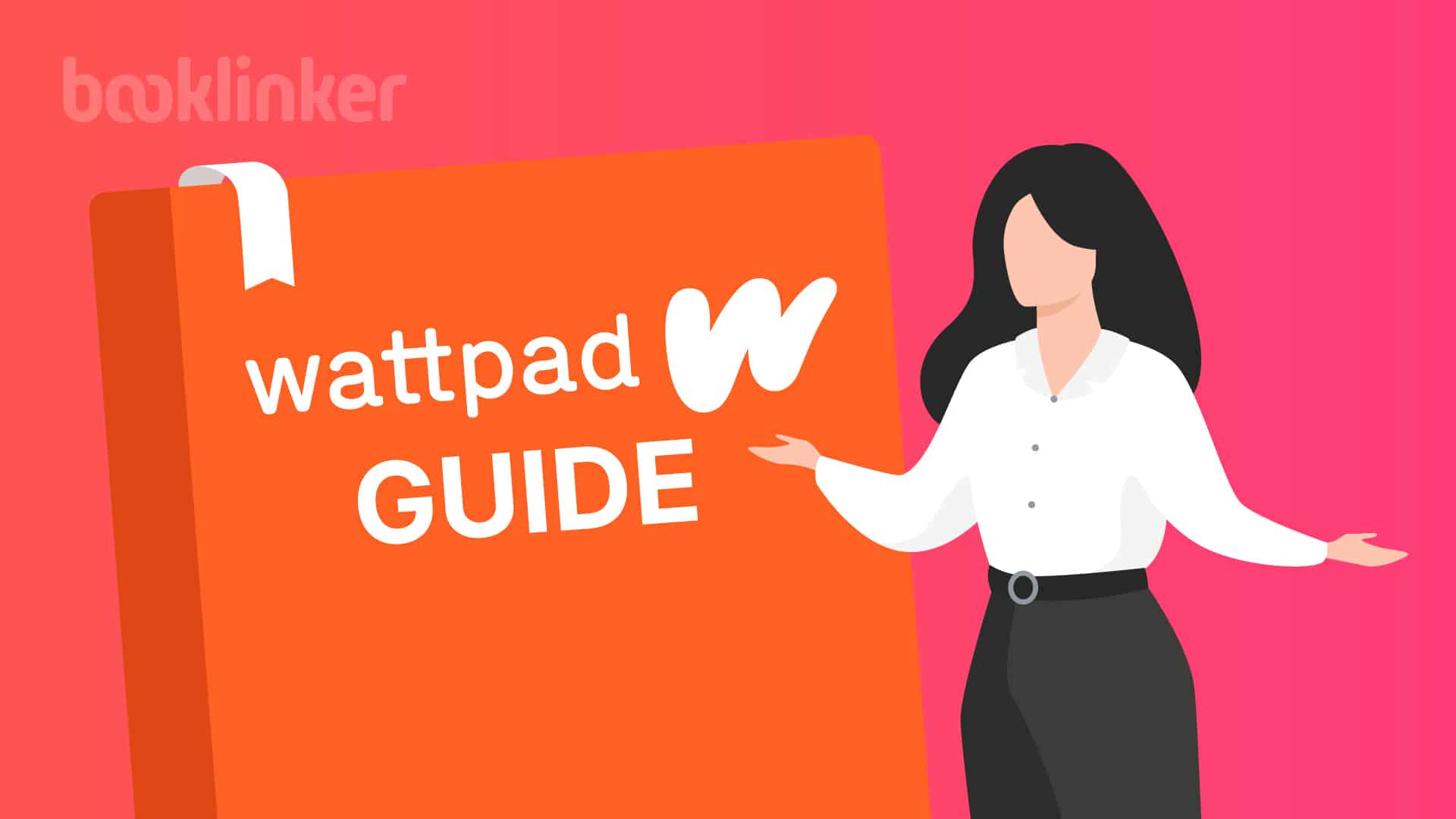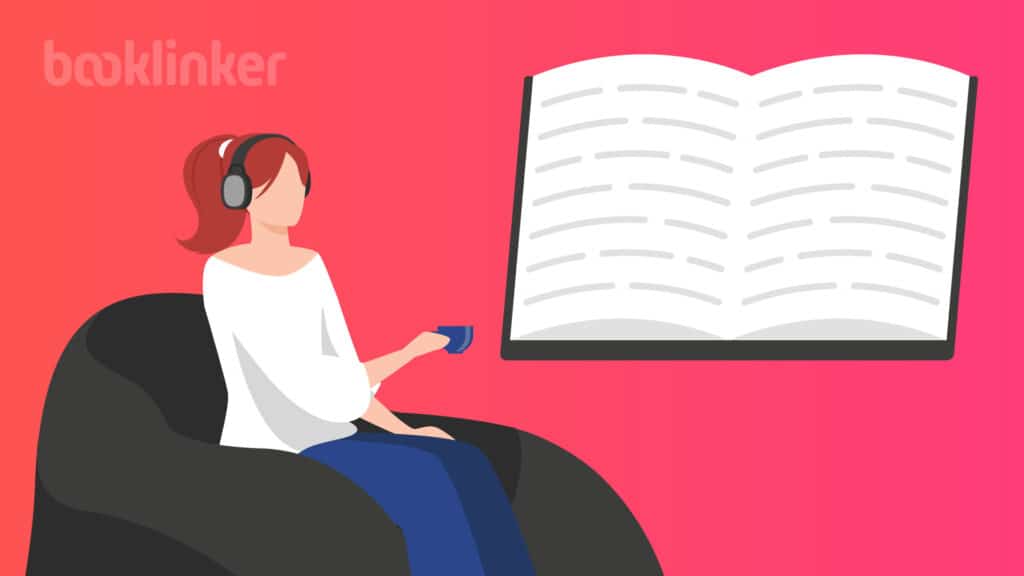
In our modern world, audiobooks have become increasingly popular, with the average person listening to over eight of them per year.
As more and more distractions come into our lives, the ability to consume books while on the go has become increasingly desirable. Over 70% of audiobook listeners do so while multitasking.
So, it’s pretty clear that releasing your book in audiobook format could lead to some extra sales.
But not all authors know what goes into making an audiobook, and that’s why we’ve created this guide.
We’ve teamed up with Timothy Howard Jackson, who also records Romance as Jack Calihan, for some information about audiobooks from the narrator’s point of view.
Between the two names he has narrated more than 130 audiobooks in just over 3 years.
Without further ado, let’s jump into our ultimate guide on creating an audiobook!
Table of Contents

Key Takeaways
- Why Make an Audiobook: Creating an audiobook can tap into a new market, reaching listeners who prefer to consume books while multitasking, potentially boosting your overall sales and audience engagement.
- What Making an Audiobook Costs: Producing an audiobook involves various costs, including narrator fees, post-production, and audio engineering, with a typical ten-hour audiobook costing around $3,000.
- What Are the Different Methods for Producing an Audiobook: Authors can choose from several methods to produce their audiobooks, such as hiring a narrator directly, recording the audiobook themselves, working with a production company, or selling audio rights to a publisher, each with its own benefits and challenges.
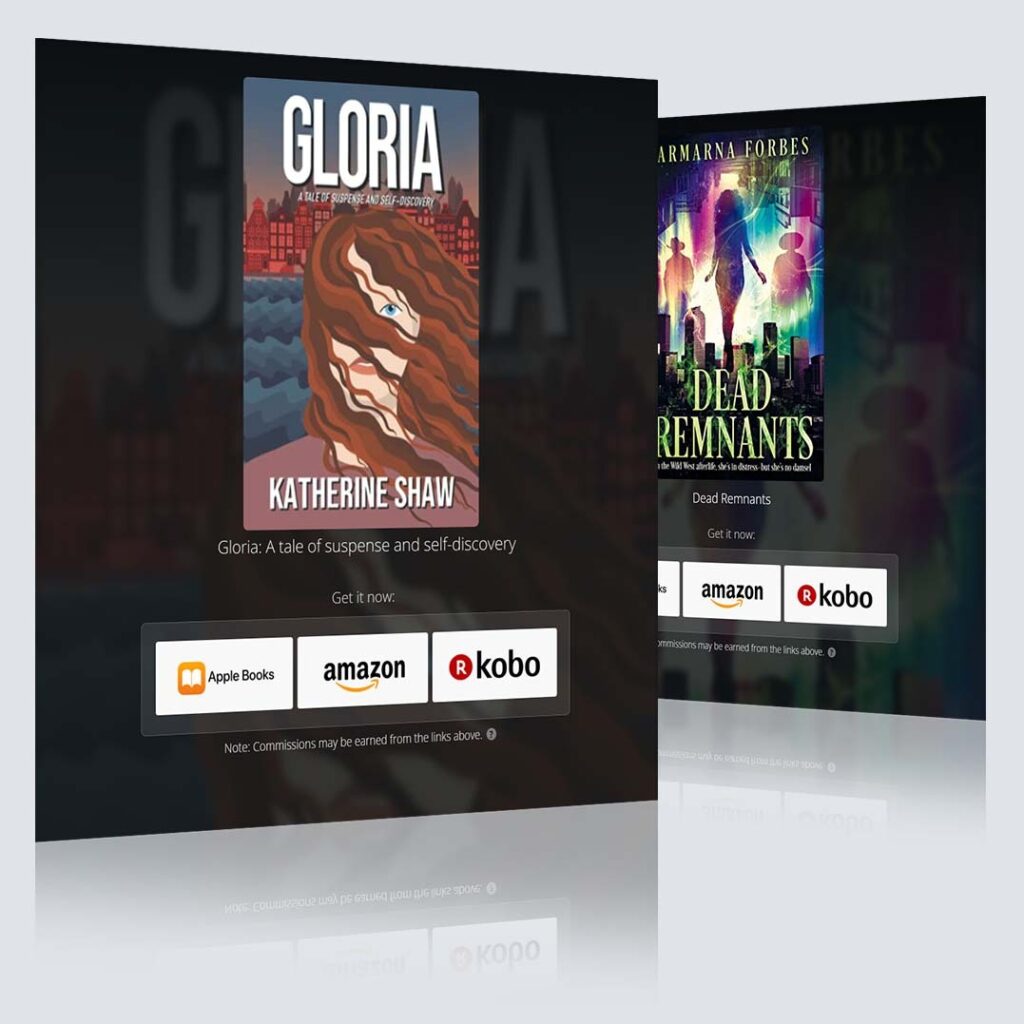
Free Universal Book Links
- Boost international sales by geotargeting readers
- Book store links update automatically based on availability
- Advanced marketing analytics
- Increase clicks with trusted links
Why Make an Audiobook
The main reason an author would want to create an audiobook is, well, to make more money.
Audiobooks have the opportunity to capture a completely different audience than an eBook or printed book.
Tip!
- People are discovering that they can enjoy a book while they do other tasks, like commuting, exercising, or housework.
So if you don’t create an audiobook, you have an untapped market.
Another reason to create an audiobook is that it is a new form of art.
Allowing a professional to interpret your words and add even more dimension to the emotions and events that unfold in your work, is something incredible. This applies even if you do it (well) yourself.
Why an Author Should Not Make an Audiobook
The first reason an author should not make an audiobook is if they do not have the necessary funds or time commitment to produce one.
It’s very difficult to provide an expected cost to produce an audiobook, but expect the average length audiobook (10 hours) to cost around $3,000.
Some authors try to bypass this investment by doing a royalty split, but in the event your book succeeds you’ll lose a lot of money in the long run.
It all depends on how much risk you’re willing to take.
Another reason to not create an audiobook is if you’re expecting the audiobook to increase sales for the book itself.
Tip!
- An audiobook will not rescue a failing book, no matter how incredible your narrator is.
On that same note, creating an audiobook to become a “complete” author is a poor reason.
The last reason to not make an audiobook is if you’re expecting the same market size that exists in the physical book market.
Audiobooks are growing in popularity, but still have a long way to go to catch up with the size of the traditional book market.
Research The Process
Now that you have an idea of whether or not it makes sense for you to create an audiobook, for those who it makes sense for, it’s time to begin the process.
And like most things in life, the first step in the process is to do some research.
Investigate what audiobook sales look like in your genre. The more that you can narrow this down, the better idea you’ll have of what you can expect to make.
Programs like Bookbeam or scanning discussion boards are helpful ways to find out this information
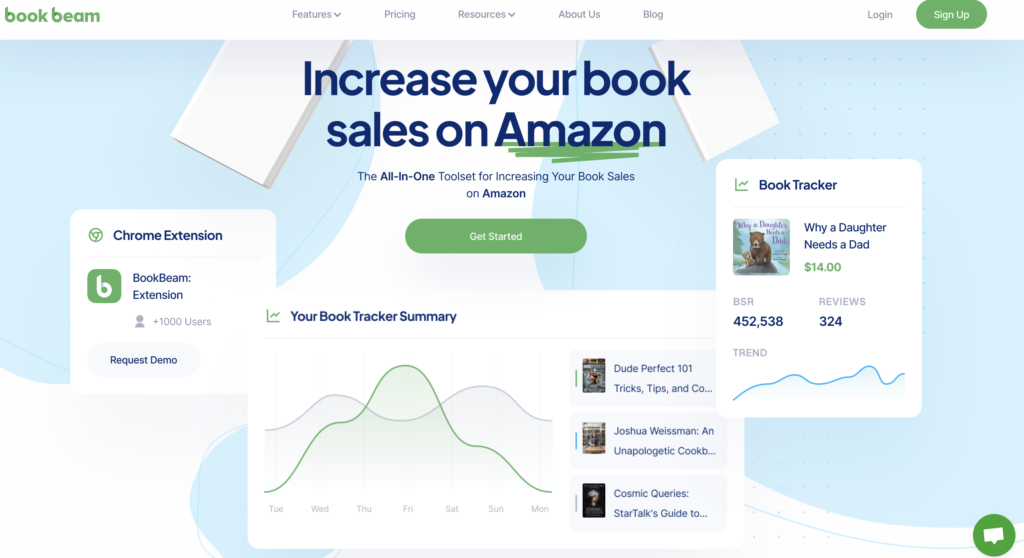
Amazon and other platforms intentionally make this data relatively private and hard to find, so there aren’t many easy or free methods to find this out.
Tip!
- Part of your research should include how much time and money it will take to create an audiobook.
We mentioned the benchmark rate of $3,000 for a ten-hour audiobook, but this might not hold true in your case.
Let’s jump into what you can expect to pay in the next section.
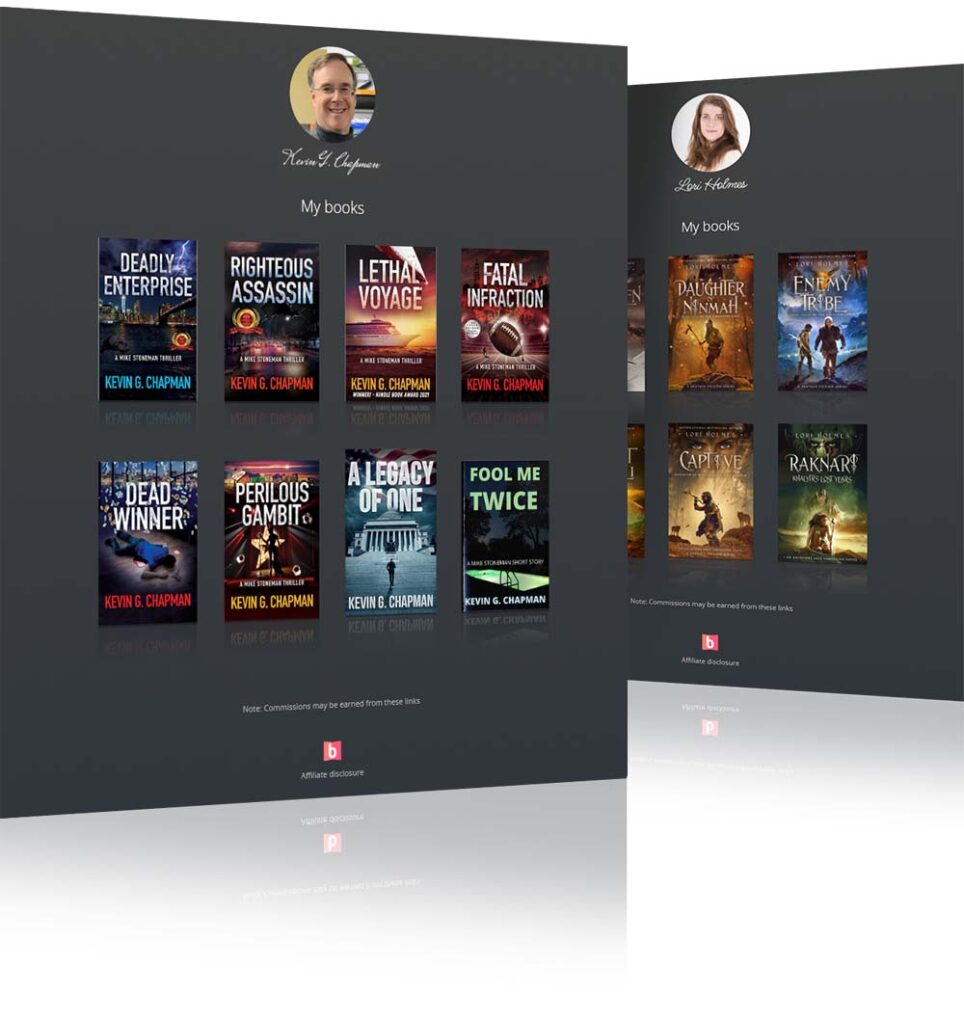
Introducing:
Booklinker Collections
One landing page for all your books. 100% free.
One link for easy sharing of your books across your backmatter, websites, emails, and social media.
What Does it Cost to Make an Audiobook?
There is a lot of work that goes into producing an audiobook, such as:
- The narrator pre-reading and taking notes on the manuscript
- Research into pronunciation of people’s names, place names, and specific phrases that are regional or in a foreign language
- The narrator recording and taking time to fix mistakes, re-record sections for clarity or working around outside noises that leak into the recording space
- A proofer listening while following along with the manuscript to find errors in the audio
- An audio engineer making sure there are no anomalies in the audio and mastering the files so that they sound their best
- Other administrative tasks like uploading and downloading files
For every hour of audio ready for listening, expect around seven hours of work by all members of the production team.
With that out of the way, let’s jump into the three most common ways to pay for narration of your book.
Per Finished Hour (PFH)
Per Finished Hour means that for every hour of audio that is ready for retail sales you pay a set amount.
In general terms, a 93,000 word novel will have an expected audio run time of about ten finished hours, but this completely depends on the speaking speed of your narrator.
As we stated in our audiobook statistics article, the average rate per finished hour is anywhere between $150/hr and $450/hr.
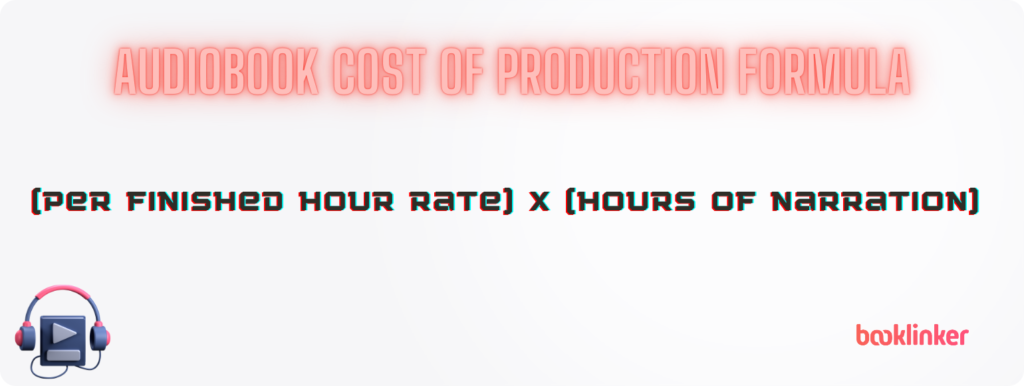
In the real world the hours of narration is calculated to the minute and you pay for the exact length of the actual run time.
There is also an industry standard of a minimum of one finished hour. If a narrator is chosen for a part that doesn’t have audio time of a full hour, they are paid for one full hour.
In this scenario, it is a work-for-hire agreement you’re buying the finished audiobook outright from the narrator. You never have to pay more in the future.
Upfront costs can be higher but you will attract a higher caliber of narrator and producer for the project. If you are hiring a narrator who is a member of the SAG-AFTRA Union, there are minimum PFH rates prescribed by the union.
Be sure to negotiate whether the cost of the narrator includes the post-production team. If not, you will pay another PFH fee for their services. If the narrator and producer are coordinating post-production their PFH rate will be higher.
Royalty Share plus Post-Production
The next method of payment is a royalty share + post production. This method is more of a pay over time plan.
Based on the contract, you agree to split profits with the narrator for a pre-decided period of time.
The ‘plus Post-Production’ in the name refers to you paying the post-production fees (or splitting those fees with the narrator/producer), at the time of service.
In this scenario you are committed to paying your narrator over time and you generally can’t make changes until the contract has run out.
Upfront costs will be lower but more risk is taken on by the narrator and/or producer.
By agreeing to pay (or split) post-production costs you have a better chance of attracting more seasoned narrators.
If you can show a history of a large number of ebook sales or previous audiobooks, this will be a more appealing option for the narrator.
Royalty Share
This is also a pay over time plan.
Based on the contract, you agree to split profits with the narrator for a pre-decided period of time.
The narrator and/or producer agrees to take on all post-production costs.
In this scenario you are committed to paying your narrator over time and you generally can’t make changes until the contract has run out.
Upfront costs in this scenario are minimal, but you will probably only attract newer narrators who are looking to build a portfolio unless you have a proven record of a large number of sales.
Type of Narration
The next decision you’ll have to make is how many narrators you want for your book.
Each type of production can enhance the experience, but ultimately it is up to you to decide which type works best for your book. If you are not sure, fall back on your research of other audiobooks in your genre.
Solo Narration
In a solo narration, all words in the manuscript are read by one narrator.
Experienced narrators will do different voices for each character, adding to the experience.
Think of this like a traditional storyteller where a group gathers close to hear a tale. This can invoke more primal, traditional experiences like having a parent read you a story.
Dual Narration
Working with dual narrators is generally the same cost as solo narration as there is not much extra production involved.
Dual narration in audiobooks involves two narrators, typically alternating between different characters’ perspectives or chapters.
Often this is gender-based.
This enhances the listening experience by providing distinct voices for different characters, which can make the story more engaging and easier to follow.
It also adds depth to the narrative, as each narrator can bring unique nuances and emotions to their respective parts, enriching the overall storytelling.
Duet Narration
Duet narration in audiobooks features two narrators who perform together, often simultaneously, throughout the entire book.
Unlike dual narration, where narrators alternate chapters or sections, duet narration involves narrators reading their characters’ dialogue and parts in real-time, creating a more dynamic and immersive experience.
This method allows for natural interactions between characters, enhancing the emotional impact and bringing a cinematic quality to the audiobook, making it particularly engaging for listeners.
Duet narration is usually more expensive than solo or dual as there’s more audio engineering involved to make the individual parts fit seamlessly together.
Multicast
Multicast narration involves multiple narrators, each voicing different characters or roles, similar to a radio play.
This approach creates a rich, layered listening experience by providing distinct voices for each character, adding depth and clarity to the storytelling.
The use of multiple narrators can enhance the emotional resonance and authenticity of the narrative, making complex plots and large casts easier to follow.
Multicast narration transforms an audiobook into an audio drama, offering a highly engaging and immersive experience for the listener.
This is much more expensive than solo, dual, or duet narration, because a lot of audio engineering is required to make the end product a seamless, coherent whole.
Narrators who’s part is less than an hour are, by the industry standard, are paid a full hour.
What are the Different Methods for Producing an Audiobook?
There are several different ways you can go about producing an audiobook, which we’ll cover next.
Method 1: Self-Production aka Hiring a Narrator Directly
The first method we’ll cover when it comes to producing an audiobook is self production by hiring a narrator directly.
The selection of narrators you have available will be entirely dependent on your budget, as well as timing.
Some tips for finding a narrator are:
- Listen to audiobooks in your genre
- Ask author friends for recommendations in your genre
- Listen to Audible/iTunes samples in your genre
- Find a willing narrator (who you would like to work with) to suggest other narrators – usually for other roles in a Dual/Duet/Multicast, but some will happily suggest competitors for the same role
- Narrator web sites
- In-person events
When looking for a narrator, here are things to keep in mind while you are deciding.
Professionalism – Does the narrator have a reputation of treating people fairly and taking the process seriously?
Voice variation/Skill – Does the narrator possess the ability to make the audiobook sound the way you’d want it to sound?
Accents – Make sure your chosen narrator can perform the accents contained in your manuscript by making sure you let them know about the accents up front and double-checking that they are proficient in those accents or allow enough prep time for them to become proficient to the level you require.
Tone, Pacing, and Passion– Does their voice convey the tone that you’re going for? Listen to some of their samples and variations. Same with pacing, can they switch up the pace?
Auditioning a Narrator
When choosing a narrator, auditions are a great way to make sure they’re the right for the job. The audition should be 3-10 minutes long (400-1400 words).
Understand that some narrators have personal limits on how much they will record – often around 5 minutes. Some will record it all. If some part is essential to the audition, make sure they know that.
Some narrators are quite busy and may not be available immediately.
Tips to ensure your audition goes smoothly:
Have your audition script ready – It doesn’t need to be one contiguous piece of your manuscript. Choose pivotal or representative sections of your book to make sure the actor understands the character(s).
Tips to ensure your audition goes smoothly:
Provide a short backstory – Explain who’s in the scene(s). Have some notes on hand explaining the character’s state of mind, motivation and situation.
Providing Manuscript – If you feel comfortable doing so, provide the full manuscript for the narrator to review.
Discuss themes and triggers – Narrators, like anyone else, have personal boundaries. Be respectful of them and share all relevant information they should know.
Once you have chosen a narrator to work with make sure you both agree on timelines, including:
- When they will get the manuscript from you
- When they will provide a pre-production sample for your approval (this is the time to make changes to narration style or character choices)
- When you will approve the sample
- When they will provide you with final files for approval (this approval is to ensure the work is complete and correct – not a time to make changes to narration style or character choices)
- How many days you have to pay the invoice
What to Expect When Production Starts
After choosing a narrator, they will require the audiobook manuscript well before recording is set to start.
The narrator will likely send a list of questions after reading the manuscript. Responding as quickly as possible keeps things on track.
You should also receive a pre-production sample of the narrator’s style and character traits they have chosen for major roles for your approval.
If there are characters or scenes you want included in this sample you need to specify up front. It will generally run 15 minutes or one chapter.
An important thing to remember is this is the time for adjustments.
Tip!
- If you have changes for different voices or pacing let the narrator know as soon as possible in order to keep production on track.
This is typically the last time you’ll have major input into the sound of your audiobook, so listen well and respond thoughtfully. You may want a second sample to review and approve your changes.
Once you have approved the narrator to move forward, expect things to get very quiet at this point while recording and post production happens.
Know that work is happening. You should receive your final files on or before your due date.
Listen to the entire book. Unless there is an egregious error in the final files the project is complete.
With the final files you should receive an invoice with the final time of the book down to the minute or hundredth of an hour, if expressed in decimal form the invoice due date.
Audio Engineering
Hire a professional audio engineer to polish the final audio files and make them sound the best they can be, with the correct specifications needed for Audible, Apple and other audiobook platforms.
In most cases, the audio engineer should not also be the proofreader. The tasks are different and trying to do both can cause issues to be missed. Expect an audio engineer to run anywhere from $75-$125 per finished hour.
Audio Proofing
No narrator (or author, for that matter) should proof their own audio. It’s easy to miss issues when listening to words that you spoke or wrote.
Have the audio proofed by an outside professional. Most narrators and proofers are trying to achieve word-perfect accuracy between the text and the audio.
Expect professional proofing to cost anywhere from $25-$40 per finished hour.
Who should do this option?
This option is great for authors with the time and temperament to shepherd the process themselves. The project and overall control of it are your responsibility.
You may or may not end up saving money. All the steps of getting a book into audio and ultimately into the ears of listeners still have to happen here.

Introducing:
Booklinker Collections
One landing page for all your books. 100% free.
One link for easy sharing of your books across your backmatter, websites, emails, and social media.
Method 2: Recording the Audiobook Yourself
The next option is to record it yourself.
We’ll be upfront and say that this method is not for a lot of people.
There’s a few different things you want to consider when it comes to recording an audiobook yourself:
- Do you have the desire to work through a very long process?
- What is your motivation for self-recording?
Is it because you want to save money (This is generally not a mindset that will lead to success).
Or is it because you want your audiobook to be narrated by you?
We understand that a narrator is not going to have the same level of understanding of your characters or story.
But if you truly want to narrate your story, consider getting some help via a coach or director to make it come out the best it can.
- Do you have the skills to create an engaging recording that is free of errors and will encourage listeners to purchase? Narrators have practiced and perfected the craft over a number of years to be able to create what they do.
- Do you have the equipment and setup to record an audiobook?
Having a proper recording setup is essential to your audiobook coming out perfect. Recording in your basement with a microphone is not going to come out well.
You want a quiet, non-reverberant space to record in, along with the following equipment and software:
- Microphone
- Microphone interface
- Digital Audio Workstation (the software needed to record and/or edit audio)
- A silent PC or PC you can place outside of your work area and access remotely
Who Will Do Post Production?
Once you’ve finished recording your audiobook, you’ll need to figure out how to go about post production.
Similarly to narrating an audiobook, this requires a lot of skill, and it’s not recommended for a beginner to do themselves.
To find someone for post production, ask in Facebook audiobook groups,social media platforms and check out sites like https://narratorlist.com/production-personnel/ for production and narration related audiobook workers.
Who should do this option?
The best candidate for someone who has the time and experience. The best self-recorded audiobooks are produced by patient, passionate, engaged writers. Many nonfiction authors choose this because listeners enjoy hearing the text in the author’s voice.
Method 3: Work with an Audiobook Production Company
Finding a company to partner with can be a great option.
Different production companies provide different levels of assistance in the process.
Brokers, like ACX facilitate bringing authors and narrators together and provide a contractual framework but that is all.
All negotiations in the process are between you and the narrator you choose to produce your work. The narrator becomes the actual audiobook producer and must provide their own post-production in order to submit retail-ready files.
Production Companies that are a level of service above brokers all have vetted rosters of narrators and will help facilitate the narrator selection process.
What separates production companies at this level is the amount of support they give the process, how much input you have and the distribution methods they employ.
Working with the company to choose a narrator
Brokers will garner you tens to hundreds of auditions based on the budget you choose to attach to your work. It is possible to reach out to individual narrators on these sites. Ultimately, it is up to you to listen and choose for yourself.
The companies that are a level of service above brokers will generally provide 3-5 narrator options per role and you will be able to choose your favorite. These 3-5 narrators will be chosen based on suitability, ability and availability.
The importance of the pre-production sample
This is when you have a say about what the finished product will sound like. Make sure you ask about what part of your manuscript will be used for the pre-production sample and make sure all of your main characters and any pivotal scenes are included.
Listen and respond as quickly as possible after you receive the sample to keep production on track.
Who should do this option?
Working with an audiobook production company is a great fit for authors who want to retain rights and have a higher level of involvement than hiring a Publisher but who don’t want to take the time to do all of the oversight on the audiobook work.
Method 4: Selling your audio rights to an Audiobook Publisher
The last method for producing an audiobook is to sell the audiobook rights to to an audiobook publisher. With this method, you have the least amount of control over the audiobook creation process.
This method does, however, let you get back to writing since the publisher will do it all.
In some circumstances, you may still have some say over the narrator selection process, and sometimes get approval of a pre-production sample, but that is about it.
Production & distribution is up to the Publisher.
Narrators and post-production people associated with
Publishers are highly vetted and are very proficient in their work. You will get a high-quality product and can have high levels of marketing in your contract.
This all comes at a cost. With this option, the majority of the royalties go to the publisher because they are the one’s covering all the upfront costs.
What Are The Different Audiobook Formats
Audiobooks are created during production in the .wav file format, which is a lossless format. Once it’s time to turn in the file to a platform, it’s almost always submitted in MP3 format.
Some specific platforms require other file formats like M4A or AAX but this is rare and those platforms usually take MP3 files and convert them to the needed formats themselves.
Audiobook Distribution Options
To get your audiobook to listeners, you need a distribution platform.
Audible Exclusive
When distributed as an Audible exclusive, you’re limited to the platform in exchange for a higher royalty per sale. You may not put it for sale anywhere else.
Audible gives their best rates, 40%,to authors who commit to the platform for 7 years. After 90 days, you can request to be removed from the exclusive program.
Distributing Wide
This gets your audiobook into more retail outlets, including libraries, so it has the potential to get the attention of more people.
You will get a smaller royalty from Amazon/iTunes (25%) but because there is a greater number of outlets it could cover or surpass that lower amount.
Companies like Findaway Voices, Author Republic and Publisher Drive, can distribute wide.
Prep Your Book for Audio Recording
The first step is to remove any visuals you may have from your manuscript. The narrator doesn’t need them, and it will only slow them down by adding more pages.
You’ll also want to remove any unneeded text from your manuscript that won’t go into narration.
Tip!
- The audiobook manuscript should contain the exact words a narrator will say and nothing else.
There are common elements of an eBook or print book that are not generally included in an audiobook.
These elements are:
- Tables of contents
- Acknowledgments
- Footnotes
- Glossaries
- Indexes
- About the author and other similar section
If one of these things is really important to you (like acknowledgements) explain that you want them to read it.
Think about whether or not you want to add backmatter/preview of the next title to a book in a series.
This is becoming more common for the same reasons they are popular in eBooks or physical books.
Audiobook Manuscript
This is the document the narrator will prep from, usually including notes, coloring text, adding references to pronunciation, etc.
So the more simple that document is, the better.
In a perfect world, the audio manuscript should be provided in both Microsoft Word and Adobe PDF formats, cleaned of items listed above.
Prepare a character list
- Age
- Anything said about what they sound like in the book
- Their general attitude toward the world and the characters around them
- What the character looks like
- ‘Dream’ actor casting – someone who sounds perfect for the role
- Whether or not this character will reappear in later books (and in what capacity)
- Prepare a pronunciation guide
- People
- Places
- Created words
- Regional words
Profit From an Audiobook
The main factors that determine how much you make from your audiobook are:
- Cost of the Book
- Total Sales
- Royalty Rate
Cost of The Book
On Audible, the most common way to pay for an audiobook is via an Audible “Credit”. Generally speaking, members of Audible receive one credit per month from their $14.95 subscription.
Royalty Rate
As we said before, the royalty rate for an Audible exclusive is 40%. If you go wide, Audible’s rate will be 25%. Remember, if you decided to do a royalty split with your narrator, this will be even lower.
Below are some other platforms royalty rates:
- Barnes & Noble – 45%
- Kobo – 32%-55%
- Apple Books – 30%
# of Sales
The next factor is the number of sales you get. This is difficult to tell before you’ve released the book, but the amount of sales your print book is getting is a decent indicator.
A Few Examples
Let’s jump into an example for an audiobook that makes 100 sales.
(Total Sales) X (Price of Book) X (Royalty Rate)
(100) X (14.95) X (.40) = $598
So as you can see, this will hardly cover the costs of producing an audiobook.
Let’s look at another example for an audiobook that makes 1500 sales.
(Total Sales) X (Price of Book) X (Royalty Rate)
(1500) X (14.95) X (.40) = $8970
Considering we stated the expected cost of producing an audiobook is around $3,000, this example is much more like it. Not every author will be able to achieve this sales number, but it’s certainly possible.
Tip!
- Similar to writing a book, creating an audiobook is best for those with series, and for authors who are willing to play the long game.
Don’t expect your audiobook to make you rich overnight.
**Examples in the potential sales section are for books where the author has paid PFH. In a royalty share scenario, they would share those profits with the narrator.**
Frequently Asked Questions
How much does it cost to make an audiobook?
This depends on so many variables, especially the way you go about producing your audiobook.
But expect to pay, at minimum, $300 per finished hour when working with a narrator or production house. The average book is around 10 hours of audio, so ~$3000 is a fair estimate, along with some proofing and engineering costs.
How Long Does it Take to Produce an Audiobook?
The absolute minimum amount of time it would take to produce a ten-hour audiobook is one month, with the maximum taking around six months. Some delays you might run into are narrators or production companies not being available, as well as lags in distribution.
Can I make my own audiobook?
Yes you could as we stated above, but there is more to it than you may think. You need the right space for it, expensive equipment, proper technique, professional editing, proofing, distribution and last but certainly not least marketing.
Do Audiobooks Need Different Covers?
Audiobooks generally use the same cover as the print version. but the dimensions are a little bit different, being more square.
We don’t recommend distorting the image to fit the new dimensions.
If you think you might do an audiobook at any point in the future, ask your cover artist for both covers when you contract with them.
It will generally cost more to go back and ask for the audiobook cover later.
How do I Pick a Retail Sample?
When deciding what to use for the retail sample, there’s two main approaches that you can take. The first option is the first five minutes, and the other being a random five minute section that won’t spoil too much.
Conclusion
Overall, audiobooks are a growing sector of the book industry, and should not be ignored. That being said, the correct timing for producing one will vary on a per author basis.
New authors shouldn’t worry about producing one until steady sales are coming through. For experienced authors who’ve put off making them, it might be something to consider.
When it comes to the method of production, self production or working with an audiobook production company are going to be your best bets, depending on how much risk you’re willing to take on.
And that’s all we’ve got on producing audiobooks for now! If you have any questions, please let us know!
Author
-
Tim records romance under the pseudonym Jack Calihan and Sci-Fi, Mysteries, Thrillers, & Non-Fiction under the name Timothy Howard Jackson with 130 audiobooks and counting produced. If you have any questions about the article above, about producing audiobooks in general, or you’d like to audition or hire Tim, you can do so by contacting him at Tim@TimNarrates.com or check out his websites TimNarrates.com and JackNarrates.com.
https://timnarrates.com/



